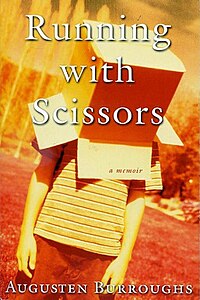--The blurb--
"This is the story of a boy whose mother (a poet with delusions of
grandeur) gave him away to be raised by her psychiatrist, a dead ringer
for Santa Claus and a certifiable lunatic into the bargain. Suddenly at
the age of 12, Augusten found himself living in a dilapidated Victorian
house in perfect squalor. The doctor's bizarre family, a few patients
and a paedophile living in the garden shed completed the tableau. Here,
there were no rules or school. The Christmas tree stayed up until Summer
and valium was chomped down like sweets. [And w]hen things got a bit slow,
there was always the ancient electroshock therapy machine under the
stairs..."
--The review--
The book market these days seems to be shifting towards a different trend to that of the late 1990s and early 2000s, swapping the once highly-popular misery lit genre for stuff inspired by vampires. It's difficult to say what's preferable. Augusten Burroughs' Running With Scissors doesn't quite combine the two, but almost matches both in terms of wackiness. At any rate, it was one of the most popular misery lit books of its time, with it being published in 2002 and made into a film in 2006. So now that we all have the chance to read this autobiography away from the prism of its whirlwind trend of several years ago, how does it stack up?
Running With Scissors' blurb suggests that the plot line might at least be darkly humorous, but this is difficult to find amongst the hackneyed portrait of the abusive relationship with the child caught in the middle, the doctor acting at the pinnacle of unprofessionalism, and the repeated name-dropping of famous brands such as Pucci. British readers will also be distracted by the inherent wrongness of the line "Sebastian gave her a shag" (N.B., the author is referring to a style of haircut and not a casual sexual encounter). Isn't this what editors of international editions are supposed to be for? Throw in incidents of bestiality, lesbianism and adultery and it's not difficult to understand why readers may begin to find all of this a little unbelievable.
In spite of all of this, the plot is essentially predictable. Yet all the while we are amazed at every turn that such people were (or should that read 'are'?) ever permitted to have, let alone keep, children. It is a shame, then, that Burroughs does not let us in on how he managed to escape this existence to become a reasonably well-functioning adult (a courtesy that at least Dave Pelzer does do us). Burroughs keeps us on our toes in other ways, but not always positively; even though he can at times be thought-provoking, touching and even spooky in his writing, he is also gruesome and uses immature similes involving Sea Monkeys. Although the author is occasionally darkly funny, such instances are rare, and are not enough to compensate for the rest.
Burroughs maintains to the end of the book that events as described were really true, but allegations have emerged since relating to defamation and fabrication, leading Burroughs to admit that the events within it were "only loosely" based on his own life. To many, this can be considered a relief that he did not really suffer the traumatising events described. However, this could also incite anger in others, as it could be perceived as a devaluation of, or lack of respect for, those that really do suffer on a similar scale. If the world of literature really has moved on - albeit only to vampire-based slush - this is arguably better than people being tempted into reading mawkish lies that ultimately are only masquerading as fact.
other works by Augusten Burroughs
Sellevision (2000)
Dry (2003)
Magical Thinking (2004)
Possible Side Effects (2006)
A Wolf At The Table (2008)
You Better Not Cry: Stories For Christmas (2009)






No comments:
Post a Comment